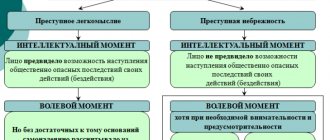ST 10 of the Criminal Code of the Russian Federation.
1. A criminal law that eliminates the criminality of an act, mitigates punishment or otherwise improves the position of a person who committed a crime, has retroactive effect, that is, it applies to persons who committed the relevant acts before the entry into force of such a law, including persons serving a sentence or those who have served their sentence but have a criminal record. A criminal law that establishes the criminality of an act, increases punishment or otherwise worsens a person’s position does not have retroactive effect.
2. If a new criminal law mitigates the punishment for an act that is being served by a person, then this punishment is subject to reduction within the limits provided for by the new criminal law.
Commentary to Art. 10 Criminal Code
1. In Part 1 of Art. 10 of the Criminal Code formulates the principle of retroactive force of criminal law, which is an exception to the requirements established in Art. 9 of the Criminal Code.
The criminal law is given retroactive force in three cases: a) elimination of the criminality of the act; b) mitigation of punishment; c) otherwise improve the situation of the person who committed the crime.
2. A law that eliminates the criminality of an act is a law that abolishes criminal liability for it. The exclusion from the Criminal Code of an article that contained signs of a special norm does not exclude the criminal liability of a person under another article of the Criminal Code, which sets out the signs of a general norm that covers this act.
3. The law mitigates punishment if it: replaces the type of punishment in the sanction with a more lenient one; excludes the most severe form of punishment from the alternative; excludes additional punishment; introduces a more lenient type of primary or additional punishment into the sanction; reduces the minimum and maximum amounts of punishment (in the case when the lower limit of punishment has become softer and the upper limit has become stricter, one should focus on the upper limit, such a law is recognized as more stringent), etc. If the sanctions of the old and new laws are the same, the crime must be classified according to the law in force at the time it was committed.
4. A law that otherwise improves the situation of a person who has committed a crime is recognized, in particular, mitigating the conditions for release from criminal liability or punishment, reducing the terms for expunging or expunging a criminal record, etc.
5. The rule on the retroactive effect of a new, more lenient criminal law applies both to persons who committed the corresponding act before the entry into force of such a law, and to persons who have already been convicted and are serving a sentence or have a criminal record under the old, more stringent law.
6. If a new criminal law mitigates the punishment for an act that is being served by a person, then this punishment is subject to reduction within the limits provided for by the norms of the Special Part of the Criminal Code in the new edition using the provisions on sentencing from the General Part of the Criminal Code applied when the punishment was initially imposed.
Legal uncertainty of retroactivity of criminal law
Let us turn once again to the text of Part 1 of Art. 10 of the Criminal Code of the Russian Federation - a criminal law that eliminates the criminality of an act, mitigates punishment or otherwise improves the position of a person who committed a crime, has retroactive force... A criminal law that establishes the criminality of an act, increases punishment or otherwise worsens the position of a person, does not have retroactive force. When reading the text of the article, everything seems more than simple and even literal.
However, the legislator, through his activities, presents us with situations that hardly fit into the text of the above norm. We are talking about the previously mentioned sanction of Part 3 of Art. 290 of the Criminal Code of the Russian Federation. Moreover, this norm is taken as an example and is not the only one in the context under discussion.
So, according to the new edition of the sanction, Part 3 of Art. 290 of the Criminal Code of the Russian Federation, the commission of the specified act is punishable:
− a fine in the amount of five hundred thousand to two million rubles,
or in the amount of wages or other income of the convicted person for a period of six months to two years, or in the amount of forty to seventy times the amount of a bribe with deprivation of the right to hold certain positions or engage in certain activities for a period of up to five years;
− or imprisonment for a term of three to eight years
with or without a fine of up to forty times the amount of the bribe and with or without deprivation of the right to hold certain positions or engage in certain activities for a period of up to five years.
Let me remind you that in the previous version the sanction began with a fine in the amount of forty times the amount of the bribe, but the maximum possible type of punishment provided for imprisonment for a term of 3 to 7 years with a fine in the amount of forty times the amount of the bribe.
The paradox of the situation is mainly that, on the one hand (from the point of view of imposing a penalty in the form of a fine), the new law improves the situation of a person, on the other (from the point of view of imposing a punishment in the form of imprisonment) it worsens, because the maximum possible punishment has been increased for 1 year.
In this regard, during criminal proceedings, controversy has already begun with the state prosecution, which believes that these changes in the sanctions of Part 3 of Art. 290 of the Criminal Code of the Russian Federation generally worsens the situation of a person based on the punishment of imprisonment, despite the legislator reducing the amount of the fine. This point of view deserves attention, however, representatives of the prosecutor’s office can only justify it with their own opinion, without reference to the rules of law.
It is unclear whether the legislator anticipated such practical issues when changing the sanctions of Part 3 of Art. 290 of the Criminal Code of the Russian Federation and a number of other sanctions articles, but the issue can hardly be called trivial.
By the way, the scientific and practical conference “Topical issues of the operation of the law over time in the light of the humanization of criminal legislation: doctrine and practice”, held by the Supreme Court of the Russian Federation, was devoted to answering questions regarding the application of the retroactive force of criminal law in 2012.
However, among the 18 answers to the questions approved by the Presidium of the Supreme Court of the Russian Federation, there is no answer to the question posed in this article.
Thus, it appears that there is legal uncertainty regarding the application of the new law, which has a “mixed” nature - improving and worsening the situation of a person.
As has already happened in domestic law enforcement, the answer to this question will be given by practice. But will it be correct?
Second commentary to Art. 10 of the Criminal Code of the Russian Federation
1. The retroactive force of a criminal law should be understood as the extension of its effect to acts committed before the law came into force. The criminal law has retroactive effect in the following cases: the criminality of the act is eliminated; mitigation of punishment or otherwise improving the situation of the person who committed the crime.
2. The criminality of an act can be eliminated by: decriminalization, i.e. exclusion of the act from the list of criminal offenses; introduction of additional conditions of criminal liability (for example, at least one more constructive element of the crime is added to the basic structure); amendments to the General Part of the Criminal Code (for example, increasing the age of criminal responsibility, etc.).
The punishment can be mitigated by introducing amendments to both the General and Special parts of the Criminal Code. For example, by lowering the lower or upper amount of punishment in the articles of the General or Special Parts of the Criminal Code; introducing or expanding the circle of persons to whom this punishment cannot be applied, or reducing the amount of wage withholding during correctional or forced labor; replacing criminal sanctions with more lenient punishments.
The situation of a person who has committed a crime can otherwise improve, for example, by: reducing the terms of expungement of a criminal record or the terms that must actually be served in order to be released on parole from serving a sentence, or by replacing the imposed punishment with a more lenient one, or by changing punishment execution regime.
3. The retroactive force of a criminal law may apply to: persons who committed a crime before the criminal law came into force; for persons serving a sentence or who have served a sentence but have a criminal record.
Types of laws that have retroactive effect
The effect of criminal norms justifying the review of sentences can be expressed:
- Complete decriminalization of the crime.
- Partial decriminalization of the act.
- Depenalization (mitigation of punishment).
- Improving the position of the perpetrator in another way.
Decriminalization of crime
Additional information
In a separate article we will look at an example of decriminalization of domestic battery. Currently, punishment for beatings, including beatings of family members, is provided for in two articles: Art. 6.1.1 Code of Administrative Offenses - for a violation committed for the first time and Art. 116.1 of the Criminal Code - for repeated beatings inflicted within a year after the previous ones.
A crime is not qualified under an article of the criminal code if the law:
- Transfers the act to the section of administrative offenses, as was the case with:
- unintentional infliction of moderate damage;
- insult;
- deliberately false advertising;
- smuggling of goods;
- leaving the scene of an accident.
- Increases the age at which the perpetrator is brought to criminal responsibility or removes the act from the list of crimes for which minors are punished.
- Reduces the number of subjects, including special ones, subject to punishment.
- Makes adjustments to the concept of insanity in criminal law, an expanded interpretation of which, taking into account age characteristics, is given in Art. 20 CC.
- Limits the territory in which the actions of the perpetrator will be classified as a crime.
- Excludes the subject of the crime from the list of subjects of the assault. From a similar list given in Art. 222, civilian firearms along with ammunition were excluded.
- Changes the criteria for the subject of the crime. In the case of mediation in bribery, it will be recognized as a criminal offense if the amount of the bribe exceeds 25 thousand rubles.
- Removes certain actions involving the subject of a crime from the Criminal Code. Thus, the illegal purchase and carrying of gas and bladed weapons were decriminalized by Federal Law No. 162 of December 8, 2003. More information about the illegal carrying of bladed weapons can be read in this article https://lexconsult.online/9091-otvetstvennost-za-nelegalnoe-noshenie- oruzhiya
- Introduces clarifications regarding the elements of the crime. For example, to recognize an act as criminal, the presence of a selfish motive or the occurrence of certain consequences will be required.
Partial decriminalization of a criminal article
The retroactive effect of a law in criminal law also applies to provisions that partially decriminalize a crime. This happens in the following cases:
- Limitations of the crime.
- Changes in Positive Law, which is referred to in the blanket disposition of the criminal article. For example, the law may exclude certain types of business activities from the list of those requiring a mandatory license. Accordingly, engaging in this type of business will not be qualified under Art. 171 CC.
- Exclusion of an act from the Special Part of the Criminal Code, but preserving its characteristics in the General Part. Thus, for deceiving consumers, the perpetrators are prosecuted not under Art. 200 of the Criminal Code (Federal Law No. 162 of December 8, 2003), and under Art. 159 of the Criminal Code for theft of someone else’s property through fraudulent actions.
- Introducing a special norm into the Criminal Code establishing liability for an act that is also mentioned in the General Part. In this case, the punishment may not necessarily be reduced, but also increased. In the second option, the adopted norm will not have retroactive effect.
Depenalization
Mitigation of liability occurs when:
- Exclusion of a certain preventive measure from the punishment system. This happened with the confiscation of property (Federal Law No. 162 of December 8, 2003) and with the arrest of minors (Federal Law No. 377 of December 27, 2009).
- Expanding the circle of persons not subject to life imprisonment or limiting the grounds for applying this measure.
- Reducing the lower and upper limits of punishment.
- Including new data in the list of mitigating circumstances or reducing the list of aggravating circumstances.
- In other cases.
A candidate of legal sciences will tell you about the cases in which the criminal law has retroactive effect:
Other cases of improvement
The law, which has retroactive effect and changes the situation for the better for the convicted person, concerns:
- Conditions of serving in places of deprivation of liberty. For example, even in the event of a relapse, a woman is not subject to serving a sentence in a high-security correctional colony (Article 58 of the Criminal Code).
- Limitation periods for criminal prosecution and execution of sentences.
- Grounds for parole.
- Other circumstances.
Question 5. The effect of criminal law in time, in space and among persons.
The operation of the criminal law in time The general principle of the operation of the criminal law in time is that the criminality and punishability of an act are determined by the criminal law that was in force at the time the act was committed. The time of commission of a crime is the time of commission of a socially dangerous action (inaction), regardless of the time of the onset of consequences. To determine the validity period of a criminal law, it is necessary to determine when the criminal law comes into force and when it ceases to apply. The moment the law comes into force can be determined by: the expiration of a certain period from the date of its official publication - federal laws come into force simultaneously throughout the entire territory of the Russian Federation ten days after the day of their official publication; indicating a different order of entry into force in the laws themselves. A criminal law may cease to have effect in cases where: the period of validity for which it was adopted expires; in connection with the adoption of a new criminal law. in space The operation of criminal law in space is based on several rules that are provided directly in the Criminal Code: territorial, citizenship, universal and real. Territorial principle “a person who has committed a crime on the territory of the Russian Federation is subject to criminal liability under this Code.” Water territory, Airspace Principle of citizenship: citizens of Russia and stateless persons permanently residing therein (stateless persons) who have committed a crime outside Russia against the interests protected by Russian criminal law are subject to criminal liability in accordance with it. The universal principle of the operation of criminal law in space is based on the common interests of all states of the world community in the fight against international crimes and crimes of an international nature (for example, terrorism, hostage-taking, etc.) The effect of criminal law on a circle of persons Only individuals can bear criminal liability. In addition, an individual must have a number of characteristics, which include: age, sanity, and the presence of additional features related to official, service, family and other responsibilities.
Question 6. Retroactivity of criminal law
The criminality and punishability of acts are determined by the criminal law in force at the time the act was committed.
The time of commission of a crime is the time of commission of a socially dangerous action (inaction) regardless of the time of the onset of consequences (
Retroactive force of a law is the extension of the effect of a criminal law to an act committed before it came into force. Typically, criminal laws do not have retroactive effect, with the exception of:
1. Criminal law eliminating the criminality of an act
2. Mitigates punishment A criminal law is recognized as mitigating punishment if it: - reduces the maximum or minimum punishment; - excludes a more severe or additional punishment from an alternative sanction; - expands the list of circumstances mitigating responsibility; - narrows the range of circumstances aggravating it.
3 . Otherwise, it improves the situation of the person who committed the crime if he: - increases the number of grounds for release from criminal liability and punishment; - reduces the statute of limitations for bringing to criminal responsibility and the statute of limitations for the execution of a conviction; - changes the conditions of parole to a more favorable direction for the convicted person from punishment; - reduces the terms of expungement of a criminal record
The law does not have retroactive force if: 1. Establishes the criminality of the act 2. Strengthens the punishment 3. Otherwise worsens the position of the person who committed the crime
Question 7. Concept, types and meaning of interpretation of laws.
Application of the law is impossible without understanding the meaning of its content, i.e. interpretation.
Interpretation is an understanding of the meaning and content of the criminal law with a view to its correct application.
The interpretation of the law varies: by subject, by methods and by volume. By subject there are: 1 ) legal interpretation
-given either by the legislator himself or by a body specifically authorized by law.
The legal interpretation is the interpretation given by the State Duma. 2) judicial
(casual) interpretation - interpretation made by the court: 3)
doctrinal
interpretation can be given by institutions, departments, individual scientists in articles, monographs, textbooks, etc.
According to interpretation techniques, they are distinguished: 1) grammatical interpretation
(using the current rules of vocabulary, spelling, morphology, syntax and punctuation of the Russian language to understand the meaning of the law);
2) systematic interpretation (referring to the norms of other branches of law or to other articles of the Criminal Code to understand the meaning of specific provisions); 3) historical interpretation (referring to the social, economic, political and legal conditions of the moment the norm was adopted in order to understand the legislator’s thought expressed in it, when after a certain period of time such thought diverges from the changed conditions). Interpretation of the angle. law in scope: 1) literal interpretation (the meaning put into the law as a result of interpretation does not diverge from its text); 2) restrictive interpretation, i.e. the law is given a more restrictive meaning 3) distributive - the interpretation of the law is given a broader meaning than follows from its literal text







